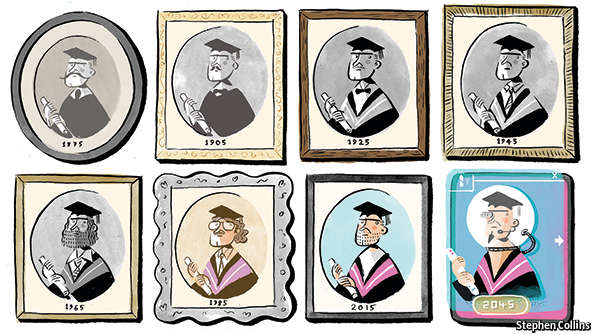An hereditary meritocracy
The children of the rich and powerful are increasingly well suited to earning wealth and power themselves. That’s a problem
“MY BIG fear,” says Paul Ryan, congressman from Wisconsin, is that America is losing sight of the notion that “the condition of your birth does not determine the outcome of your life.” “Opportunity,” according to Elizabeth Warren, a Democratic senator from Massachusetts, “is slipping away.” Marco Rubio, a Republican senator from Florida, thinks that “each element” of the sequence that leads to success “is eroding in our country.” “Of course you have to work hard, of course you have to take responsibility,” says Hillary Clinton, a former first lady, senator and secretary of state, “but we are making it so difficult for people who do those things to feel that they are going to achieve the American dream.” When discussing the chances of ordinary Americans rising to the top, politicians who agree about little else sound remarkably similar.
Before the word meritocracy was coined by Michael Young, a British sociologist and institutional entrepreneur, in the 1950s there was a different name for the notion that power, success and wealth should be distributed according to talent and diligence, rather than by accident of birth: American. For sure, America has always had rich and powerful families, from the floor of the Senate to the boardrooms of the steel industry. But it has also held more fervently than any other country the belief that all comers can penetrate that elite as long as they have talent, perseverance and gumption. At times when that has not been the case Americans have responded with authentic outrage, surmising that the people at the top are, as Nick Carraway said, “a rotten crowd”, with bootlegging Gatsby better than the whole damn bunch put together.
Today’s elite is a long way from the rotten lot of West Egg. Compared to those of days past it is by and large more talented, better schooled, harder working (and more fabulously remunerated) and more diligent in its parental duties. It is not a place where one easily gets by on birth or connections alone. At the same time it is widely seen as increasingly hard to get into.
Some self-perpetuation by elites is unavoidable; the children of America’s top dogs benefit from nepotism just as those in all other societies do. But something else is now afoot. More than ever before, America’s elite is producing children who not only get ahead, but deserve to do so: they meet the standards of meritocracy better than their peers, and are thus worthy of the status they inherit.
It takes two
This is partly the result of various admirable aspects of American society: the willingness of people to give money and time to their children’s schools; a reluctance to impose a uniform model of education across the country; competition between universities to build the most lavish facilities. Such traits are hard to object to, and even if one does object they are yet harder to do anything about. In aggregate, though, they increase the chances of wealthy parents passing advantage on to their children. In the long run that could change the way the country works, the way it thinks about itself, and the way that people elsewhere judge its claim to be an exceptional beacon of opportunity.
Part of the change is due to the increased opportunities for education and employment won by American women in the twentieth century. A larger pool of women enjoying academic and professional success, or at least showing early signs of doing so, has made it America’s elite: An hereditary meritocracy | The Economist:

